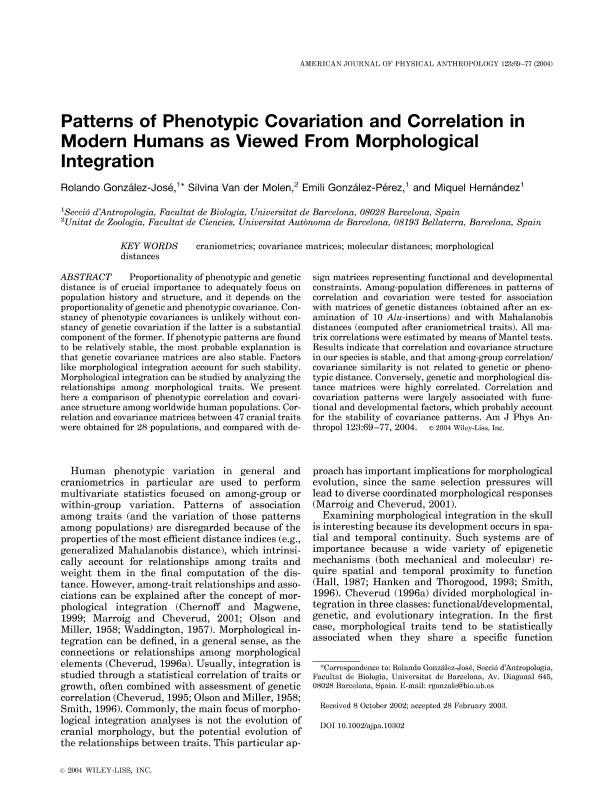Mostrar el registro sencillo del ítem
dc.contributor.author
González José, Rolando

dc.contributor.author
Van Der Molen, Silvina

dc.contributor.author
González Perez, Emili
dc.contributor.author
Hernández, Miquel
dc.date.available
2020-05-04T18:13:57Z
dc.date.issued
2003-05
dc.identifier.citation
González José, Rolando; Van Der Molen, Silvina; González Perez, Emili; Hernández, Miquel; Patterns of phenotypic covariation and correlation in modern humans as viewed from morphological integration; Wiley-liss, Div John Wiley & Sons Inc; American Journal Of Physical Anthropology; 123; 1; 5-2003; 69-77
dc.identifier.issn
0002-9483
dc.identifier.uri
http://hdl.handle.net/11336/104163
dc.description.abstract
Proportionality of phenotypic and genetic distance is of crucial importance to adequately focus on population history and structure, and depends on proportionality of genetic and phenotypic covariance. Constancy of phenotypic covariances is unlikely without constancy of genetic covariation if the later is a substantial component of the former. If phenotypic patterns are found to be relatively stable, the most probable explanation is that genetic covariance matrices are also stable. Factors like morphological integration account for such stability. Morphological integration can be studied by analyzing the relationships among morphological traits. We present here a comparison of phenotypic correlation and covariance structure among worldwide human populations. Correlation and covariance matrices between 47 cranial traits were obtained for 28 populations, and compared with design matrices representing functional and developmental constraints. Among-population differences in patterns of correlation and covariation were tested for association with matrices of genetic distances (obtained after an examination of 10 ALU-insertions) and with Mahalanobis distances (computed after cranial traits). All matrix correlations were estimated by means of Mantel tests. Results indicate that correlation and covariance structure in our species is stable and that among-group correlation/covariance similarity is not related with genetic or phenotypic distance. Conversely, genetic and morphological distance matrices were highly correlated. Correlation and covariation patterns were largely associated with functional and developmental factors, which probably account for the stability of covariance patterns.
dc.format
application/pdf
dc.language.iso
eng
dc.publisher
Wiley-liss, Div John Wiley & Sons Inc

dc.rights
info:eu-repo/semantics/openAccess
dc.rights.uri
https://creativecommons.org/licenses/by-nc-sa/2.5/ar/
dc.subject
CRANIOMETRICS
dc.subject
COVARIANCE MATRICES
dc.subject
MOLECULAR DISTANCES
dc.subject
MORPHOLOGICAL DISTANCES
dc.subject.classification
Biología

dc.subject.classification
Ciencias Biológicas

dc.subject.classification
CIENCIAS NATURALES Y EXACTAS

dc.title
Patterns of phenotypic covariation and correlation in modern humans as viewed from morphological integration
dc.type
info:eu-repo/semantics/article
dc.type
info:ar-repo/semantics/artículo
dc.type
info:eu-repo/semantics/publishedVersion
dc.date.updated
2020-04-27T14:42:28Z
dc.identifier.eissn
1096-8644
dc.journal.volume
123
dc.journal.number
1
dc.journal.pagination
69-77
dc.journal.pais
Estados Unidos

dc.journal.ciudad
Hoboken
dc.description.fil
Fil: González José, Rolando. Universitat Autònoma de Barcelona; España. Consejo Nacional de Investigaciones Científicas y Técnicas. Centro Científico Tecnológico Conicet - Centro Nacional Patagónico; Argentina
dc.description.fil
Fil: Van Der Molen, Silvina. Consejo Nacional de Investigaciones Científicas y Técnicas. Centro Científico Tecnológico Conicet - Centro Nacional Patagónico; Argentina. Universitat Autònoma de Barcelona; España
dc.description.fil
Fil: González Perez, Emili. Universitat Autònoma de Barcelona; España
dc.description.fil
Fil: Hernández, Miquel. Universitat Autònoma de Barcelona; España
dc.journal.title
American Journal Of Physical Anthropology

dc.relation.alternativeid
info:eu-repo/semantics/altIdentifier/doi/http://dx.doi.org/10.1002/ajpa.10302
dc.relation.alternativeid
info:eu-repo/semantics/altIdentifier/url/https://onlinelibrary.wiley.com/doi/abs/10.1002/ajpa.10302
Archivos asociados
